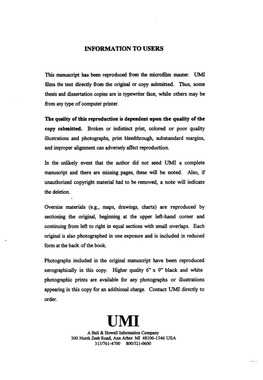| dc.contributor.author | Buster, Maury Allen. | en_US |
| dc.date.accessioned | 2013-08-16T12:29:31Z | |
| dc.date.available | 2013-08-16T12:29:31Z | |
| dc.date.issued | 1997 | en_US |
| dc.identifier.uri | https://hdl.handle.net/11244/5432 | |
| dc.description.abstract | DF analyses by race produced interesting findings. Each of the groups--Whites, Blacks, and Hispanics--differed from each other in some form. In each case, the c$\sp2$ and h$\sp2$ estimates were small to moderate for both light and heavy drinking behavior. Significantly nonshared effects were found for the White group for heavy drinking behavior. The gender pair analyses were similar to those by race. Each of the gender pairs--female-female, male-male, and opposite-sex--differed from each other in some form, and the c$\sp2$ and h$\sp2$ estimates were again small to moderate for light and heavy drinking. Significant nonshared effects were found for male pairs for both heavy and light drinking behavior. | en_US |
| dc.description.abstract | DF analyses were conducted for the entire set of kinship pairs in the NLSY dataset, with additional analyses by race and by gender pair. The estimates of heritability (h$\sp2$) and shared environment (c$\sp2$) were small to moderate for the entire dataset for both light drinking and heavy drinking behavior. The h$\sp2$ estimate was slightly higher in each case. Nonshared genetic measures of self-esteem and locus of control accounted for a significant portion of the remaining variance in heavy drinking behavior. | en_US |
| dc.description.abstract | The results are presented in relation to earlier research findings. Additionally, implications and future directions are discussed. | en_US |
| dc.description.abstract | Alcohol use and abuse are topics that have been studied for many years. The research, including twin studies, adoption studies, and family history/high risk studies have focused primarily on the genetic or familial ties as related to these topics. Accordingly, results have consistently implied a genetic factor in the determination of alcohol abuse. However, little research has been conducted in search of environmental factors in the determination of alcohol use and abuse. Additionally, recent publications from other areas have documented the importance of "nonshared" genetic and environmental influences in accounting for the variability in personality measures. This study uses the NLSY dataset and a biosocial modeling approach called DeFries-Fulker (DF) Analysis to estimate the extent of the shared genetic and environmental influences on alcohol use. Additional analyses using an extended version of the DF model are conducted to identify nonshared genetic and environmental effects on alcohol use. | en_US |
| dc.format.extent | viii, 37 leaves ; | en_US |
| dc.subject | Alcoholism Social aspects. | en_US |
| dc.subject | Alcoholism Genetic aspects. | en_US |
| dc.subject | Nature and nurture. | en_US |
| dc.subject | Drinking of alcoholic beverages. | en_US |
| dc.subject | Psychology, Social. | en_US |
| dc.subject | Biology, Genetics. | en_US |
| dc.title | Genetic and environmental influences on alcohol use: DF analysis of NLSY kinship data. | en_US |
| dc.type | Thesis | en_US |
| dc.thesis.degree | Ph.D. | en_US |
| dc.thesis.degreeDiscipline | Department of Psychology | en_US |
| dc.note | Source: Dissertation Abstracts International, Volume: 58-02, Section: B, page: 1019. | en_US |
| ou.identifier | (UMI)AAI9721052 | en_US |
| ou.group | College of Arts and Sciences::Department of Psychology | |
